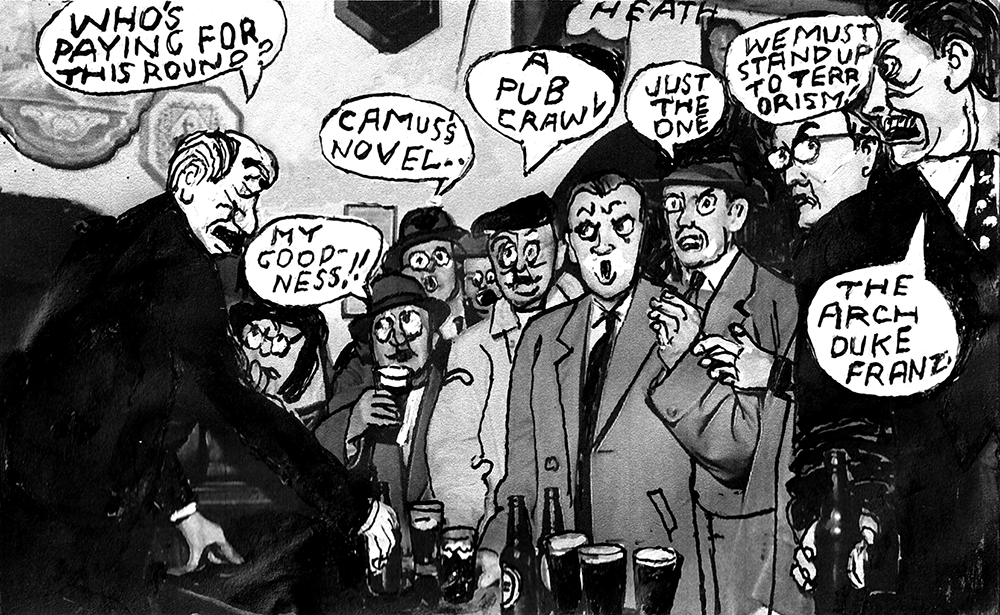Kamala Harris is the Democrats’ new hope for keeping Agent Orange out of the Oval Office. It’s probably for the best. Many younger, more progressive voters saw president Joe Biden as a dinosaur, a relic of a bygone era. Among other things, Biden was an old-school drug warrior who co-wrote the 1986 Anti-Drug Abuse Act, which made the penalty for handling crack rocks a hundred times more severe than powder cocaine; the 1994 Clinton Crime Bill, which massively expanded the prison-industrial complex; and, in 2002, he proposed the Reducing Americans’ Vulnerability to Ecstasy (RAVE) Act, which would have held party organisers liable for drugs consumed on their premises (this had the side-effect of keeping safety teams off-site, as doing otherwise would implicitly admit that their guests swaying to techno with pacifiers in their mouths were indeed illicitly inebriated).
Donald Trump’s marijuana stance is more ambiguous
But recently Biden seemed to have lightened up, at least when it comes to cannabis: in May, he announced plans to downgrade it from its strict Schedule I, the same category as heroin, to the less restrictive Schedule III. However, this is still yet to catch up to nearly half of America, which has already lifted the ban on a state level. With Biden gone, could Harris finally end the war on weed?
It would be an easy vote-winner, especially among younger voters among whom Biden’s popularity plummeted over the war in Gaza: 68 per cent of young Americans saw his presidency as a failure, according to a CNN poll back in April. But when it comes to pot, the majority of Democrat voters and a substantial – 42 per cent according to a recent Pew poll – portion of Republicans back full legalisation. Third-party candidate Robert F. Kennedy Jr. has already added it to his platform.
In 2018, there were still more arrests for marijuana in the United States than every violent crime put together. Being arrested can lead to a criminal record, prison, broken families, being evicted or deported, and losing your job, welfare, and even your right to vote. On average, this was three-and-a-half times likelier to happen to black Americans than whites – and in Pickens County, Georgia, nearly a hundred times more likely. After all, who’s going to pull over a little old white lady?
As San Francisco’s former district attorney who oversaw nearly 2,000 marijuana cases, Harris might appear an unlikely reformer. But five years ago, the ex-prosecutor admitted smoking grass in her wayward youth. In doing so, she joined stoned statesmen like Barack Obama, Justin Trudeau, George Bush and David Cameron; unlike Bill Clinton, she happily inhaled. Since her admission, she’s consistently held that the drug should be taken off the naughty list, and backed the relevant legislation. ‘I think it gives a lot of people joy,’ she said. ‘And we need more joy in the world.’
Someone cynical might say that Kamala sensed which way the wind was blowing and scrambled to cover herself. Having experienced the justice system myself, it doesn’t quite sit right with me that someone who inflicted that on others while laughing off her own herbal indiscretions now uses reform for political clout.
But people should be allowed to change, and if Harris follows through on what are now her purported beliefs, does it really matter? She could even shrewdly leverage her past to her advantage. After all, cops are best-placed to see the failures of the drug war. There’s even a whole organisation – the Law Enforcement Action Partnership, formerly Law Enforcement Against Prohibition – of cops and ex-cops, judges, prosecutors and so on, actively working for drug reform.
Donald Trump’s marijuana stance is more ambiguous. While he’s expressed some rather extreme positions, such as marching drug dealers to the gallows and sending special ops to assassinate cartel heads in Mexico (seemingly basing his foreign policy on the movie Sicario), when it comes to cannabis he doesn’t seem to care much either way, rather letting the states decide.
As it stands, state-by-state legalisation is a bit of a mess. What’s considered legitimate entrepreneurial activity in Colorado can leave you rotting in prison next door in Kansas. Growing in one state then selling in another is therefore an attractive proposition for gangsters; the Mexican cartels and Chinese triads staff their clandestine plantations with trafficked migrant workers and settle scores with firearms like cowboys in the Old West. Meanwhile, federal prohibition means it’s difficult for legitimate marijuana businesses to open bank accounts, making them cash-only and an easy mark for armed hold-ups. As of 2023, three-quarters of America’s weed industry was still underground.
Still, there’s been some encouraging signs so far. There’s been no obvious surge of pot-induced psychosis in those states where it has been legalised, and neither have the denizens of such states partaken in fentanyl or other narcotics any more than usual.
Should the next president of the United States legalise cannabis nationwide, it could have ripple effects across the globe. The US imposed prohibition on many countries, such as Nepal and Cambodia, threatening to withhold much-needed aid unless they stopped red-eyed beatniks wandering their streets. The Nepalese are particularly incensed that the Americans forbade it for them but are now permitting it for themselves. As for the UK, lawmakers may be encouraged to take bolder stands instead of hiding behind a ‘tough-on-crime’ agenda that’s brought our prisons to crisis point.







Comments